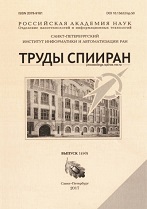|
|
Trudy SPIIRAN, 2009, Issue 10, Pages 11–32
(Mi trspy31)
|
|
|
 |
This article is cited in 1 scientific paper (total in 1 paper)
National security and science
R. M. Yusupova, V. L. Shultzb
a St. Petersburg Institute for Informatics and Automation of RAS
b Security Problems Research Center of the Russian Academy of Sciences
Abstract:
The paper contains a consideration of the triple problem related to national safety and science interconnections: national security science, science security, and whether science can be estimated as dangerous or threatening.
The role of science in national security maintenance is quite evident. Without scientific support or consideration, it is impossible to develop and perform rational policy in the area of national security and state government. Based on fundamental and applied research, new technologies, materials, instruments, and systems are developed; they are implemented in security-related areas. The relations between science and security are most clearly outlined in the area of defense security. In his-tory, the period of the Great Patriotic War (1941–1945) and the after-war years were an exemplification of the relations.
Science security is understood as how well science is protected against outer and inner threats dangerous for its persistence and further development. The most serious threats against science are its ideological pumping, political parties and gov-ernment interventions into scientific society management, budget deficiency, lack of human resources, absence of demand for obtained research results, low status in the whole society, false sciences development etc.
The paper discusses how these threats influence on science development in Russia.
The problem “If science is dangerous” is related to the observation that almost each scientific discovery or new technology can have double or multiple usages, including the options like “in the favor of a man”, “against a man”. For example, discoveries in physics were used for nuclear and laser weapons development, dis-coveries in biology led to bacteriological weapons development, discoveries in chemistry to poisoning weapons, discoveries in informatics to informational weap-ons, etc.
In most cases, scientific discoveries dangerous consequences appear when the results obtained by scientists are taken possession of by political establishment, au-thority officers, military establishment, or terrorists. So far, the most effective mean against anti-human applications of science remains international agreements, social movements and organization activities.
Keywords:
science, national security, security maintenance, threat, degree of protection.
Received: 02.12.2009
Citation:
R. M. Yusupov, V. L. Shultz, “National security and science”, Tr. SPIIRAN, 10 (2009), 11–32
Linking options:
https://www.mathnet.ru/eng/trspy31 https://www.mathnet.ru/eng/trspy/v10/p11
|

| Statistics & downloads: |
| Abstract page: | 985 | | Full-text PDF : | 908 |
|




 Contact us:
Contact us: Terms of Use
Terms of Use
 Registration to the website
Registration to the website Logotypes
Logotypes







 Citation in format
Citation in format 
